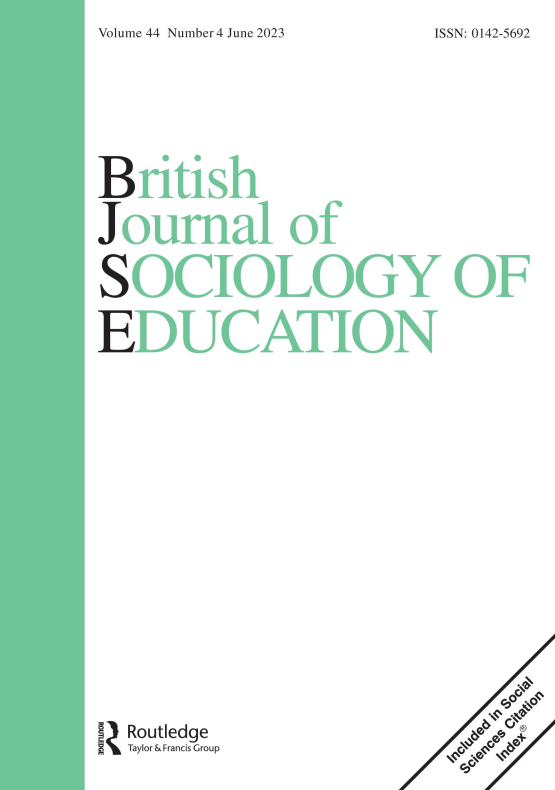Submit a Manuscript to the Journal
British Journal of Sociology of Education
For a Special Issue on
Reclaiming education in a AI era: reframing the “educational problems” that technology claims to solve
Abstract deadline
04 March 2024
Manuscript deadline
16 September 2024

Special Issue Editor(s)
Reclaiming education in a AI era: reframing the “educational problems” that technology claims to solve
Technology is often portrayed as the solution to fix problems in education, and the promotion of generative AI since the end of 2022 has brought about the most recent promise of technology to transform education. This special issue invites contributions that interrogates these new promises of AI-based technologies in education, understand how AI contributes to the production of social relationships, identifying the key actors, and their associated interests, ideologies, and agendas, examining the unproblematised issues around technology in education that need to be investigated. Taking a distinctly sociological perspective, and drawing on diverse methodologies we invite papers that aim to identify and reframe educational problems in an AI era.
The prevalent discourse around education technology often frames technology as a way of solving problems in education such as poor student-teacher ratios, assessment malpractices, biases in human decision-making, traditional or outmoded teaching and learning that is not aligned with wider societal transformation, or limited access to education in deprived and remote areas. Promises range from using technology to deliver personalised learning, detect, measure, and intervene in student behaviours, to equalise educational access for all, to close attainment gaps, to support society’s most marginalised, to introduce ‘innovation’ within outdated practices, to save teachers and institutions time, or to make learning more efficient. However, so far there is little evidence that technology can “improve” education beyond narrow measures of specific cases. Moreover, it is contested what ‘improvement’ in education means, whom such improvements benefit, and who determines in which direction education should strive to evolve. Studies have argued that the problematisation rhetoric may serve first and foremost the interests of various stakeholders involved in education technology. The current dominant discourse of ‘problems’, which can be characterised by technological solutionism, is much more shaped by the alignment of governments and the technology industry’s political and economic interests, rather than by the “on the ground” experiences of teachers, students, school admin, and parents. The neglect of these on the ground experiences, and especially of experiences and perspectives of marginalised groups, leads to ignoring needs that are specific to local social and political configurations in a variety of different educational environments. Such neglect may be translated into education technology designs and have societal consequences.
This special issue addresses three main questions. First, has the problematisation rhetoric shifted with the emergence of AI-based technologies, and if so, what are the new ‘problems’ that AI-based technologies promise to solve for Education? Second, what are the problems that have not been addressed, and why have they remained unproblematised? And third, what are the consequences of not addressing them?
Building on existing critiques of the technological fix in education (e.g. Bulger 2016; Morozov 2013; Reich 2020; Robins and Webster 1989; Weller 2015) and wider literature from, for example, STS and the Sociology of Education, this special issue seeks to highlight the current focus of tech fix arguments, while also seeking to identify and surface other educational problems that require sociological attention. In doing so, this special issue will display a range of identified new ‘problems’ and show how they may converge or contradict each other, and shed light into the mechanisms forming these visible and invisible problems, proposed solutions, and the consequences when voices of some actors dominate others.
This issue seeks to provide high-quality, original analyses that situate the field of AI and education within the broader social fabric, examining educational policy, provision, processes, and practices across different societies and cultures. We welcome papers that are embedded in sociological theory and may focus but are not limited to questions of political economy, modes of governance, and classroom practice in relation to a broad range of issues including social justice, ethics and sustainability; and may draw on a variety of conceptual lenses, including decolonial, feminist, and intersectional perspectives. Submissions should be methodologically sound, and should elucidate new problems or perspectives in education, potentially arising from or impacted by AI technologies.
We invite submissions which discuss the visible and invisible problems around education technology in the “AI era” with a sociological lense by addressing aspects such as:
- AI, education and social stratification/social mobility
- Democracy, equity, social justice, and the public good
- Learning environments and the social and cultural context of educational institutions
- Political economy of edtech
- Education technology as material and discursive practices
- Sustainability and environmental considerations in edtech
- Knowledge and pedagogy in the “AI era”
- AI and alternative Educational futures
- Educational practices at the local, national, and global level
Looking to Publish your Research?
Find out how to publish your research open access with Taylor & Francis Group.
Choose open accessSubmission Instructions
Submission Instructions
We are currently soliciting abstracts for proposed papers for the special issue. Abstracts should be no longer than 300 words and be accompanied by up to six keywords.
• Deadline for submission of abstract: 4th March 2024
• Successful authors informed: 1st April 2024
• Deadline for submission of full papers: 16th September 2024
Full papers are expected to be no more than 8000 words (please refer to the journal website for full ‘instructions for authors’)
All papers will be subject to the usual blind reviewing and refereeing processes.
Please send abstracts and keywords to the guest editors by Monday 4th March 2024. Email:
[email protected]. Please put ‘Abstract BJSE SI’ in the subject